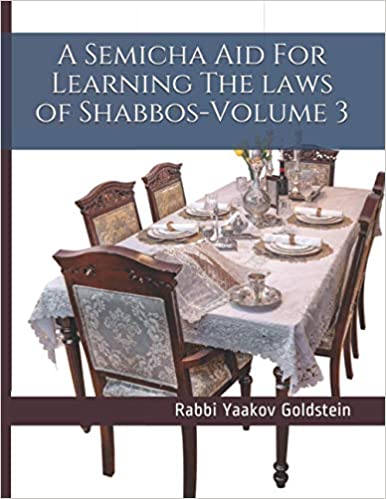

To purchase this Sefer, click here
8. Giving assistance to a gentile which is giving the medical treatment:[1]
Having the sick person himself assist in his treatment: Anything which is if forbidden to be done [for the ill person] through a Jew is also forbidden to be done by the sick person himself, however if a gentile does it, it is permitted for the sick person to slightly assist him, such as for example a gentile which is applying ointment to the eye of a Jew towards the conclusion of his sickness in which his [eyes] slightly burn, then it is permitted for him to open and close his eyes in order so that the ointment enter into it well, being that assisting [the gentile] is [considered] meaningless so long as the gentile is capable of doing [the treatment] himself without the help of the Jew and just having the Jew not refrain him from doing it as explained above.
[Furthermore] even if the gentile is doing for him a Biblically forbidden action in a scenario where it is permitted [for a Jew to have him do so then] the sick person is allowed to assist him in the way explained [two lines above that the gentile would anyways be able to do it].
The Reason: (Now, although one who assists in doing a Biblical prohibition is [transgressing a] fully fledged Rabbinical prohibition as will be explained in chapter 346[2] and [thus] even upon assisting in doing a Rabbinical prohibition he [transgresses] at the very least a Rabbinical decree upon a Rabbinical decree [which is also forbidden], nevertheless here since [the Sages] rescinded the Rabbinical prohibition of asking a gentile [to do a forbidden act] for the need of a sick person, so too we rescind the Rabbinical prohibition of assisting him being that this too is for the need of the sick person. As through the assistance the treatment is done much better from how it were to be done through the gentile alone, such as for example [having the patient] close his eyes so that the ointment get absorbed in well and so too to open the eyes for the ointment to be entered into, or to open ones mouth for ones tooth to be removed [in which in all of these cases] although the gentile could have done [these actions] himself nevertheless the Sages did not require this, to place this responsibility on the gentile, and not allow the patient, for whom the treatment must be done to, to comply.)
{Thus, although one does slightly assist [the gentile] [in applying the treatment] [nevertheless] it is meaningless and does not pose a problem[3], as even if the Jew were to not help him in this assistance [that he is giving] but would also not stop [the gentile from doing his job] then the gentile would be able to do it himself.[4]}
Having another Jew assist the gentile: (However when the gentile does other matters that are forbidden even Rabbinically then a Jew (other than the patient) may not assist him with the treatment since there is no need at all for his assistance being that the gentile is capable of doing it all himself.
However, if there is a need for his assistance that through assisting the treatment will work better than if it were to be done by the gentile alone, then it is permitted for even another Jew to slightly assist him.)
If the assistance is critical for the treatment: [However] if it is impossible to do [the treatment] without the assistance of a Jew then it is forbidden even for the sick person himself to assist.
|
Having the patient or other Jews give assistance to a gentile which is giving the medical treatment:[5] In all the above cases {cases 2, 3, 4} that a gentile may administer treatment but a Jew may not do even a Rabbinical prohibition [without an irregularity], assistance may be given, to the gentile which is doing the treatment, by any Jew if a) it does not involve any other prohibition[6] and b) The gentile is able to administer the treatment himself even without this assistance, and c) The treatment will work better with this assistance. If the treatment does involve a Biblical or Rabbinical prohibition, then only the patient himself may assist the gentile [in matters that his assistance have no prohibition involved].
|
________________________________________________________
[1] Admur 328:21
[2] Perhaps this refers in truth to 347 Halacha 1 and 3.
[3] Admur 328:3 and 20
[4] Admur 328:3
[5] Halacha 21
[6] As ideally the mere giving of treatment is itself a prohibition, thus the case here is discussing that no other prohibitions are involved in the assistance given.


Leave A Comment?
You must be logged in to post a comment.